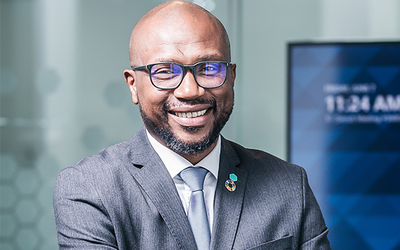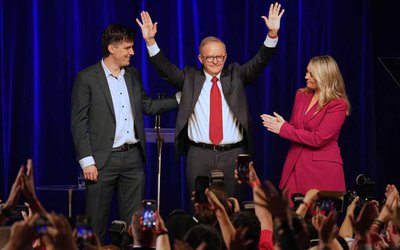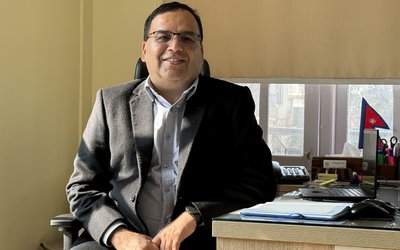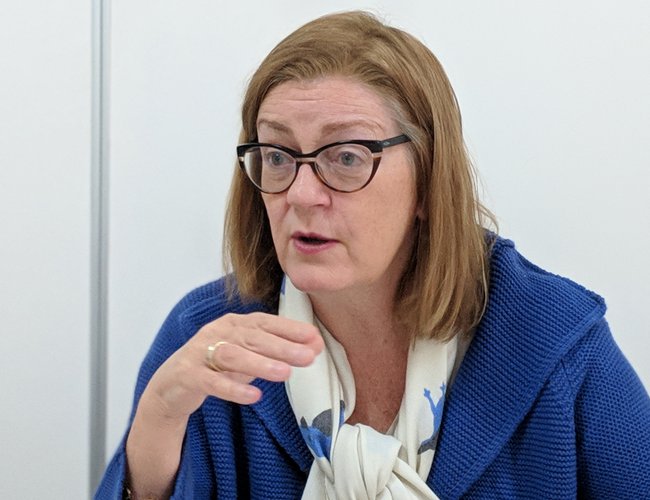
How do you see the current state of the European Union’s support to Nepal?
Well, I would say the European Union’s support to Nepal has been growing over the years. In the last 7-year cycle it tripled from its previous amount, it is currently €360 million from €7 million over 7 years. We’ve always aligned our support with the government’s political priorities. A major part of the support goes directly to the government which we call budget support, it is one of the preferred modalities of the government in terms of development assistance, and we give development support up to, almost, 60% of our total aid which is quite a lot. We also then, with the remaining funding, use it with implementing partners, so we go through civil society and other partners like the UN and NGOs, CSOs and so on, we consider that also a department of importance to our support. We have at least 3 bilateral local areas of support that’s rural development, education and health, nutrition included in that; transition to democracy, which we support public financial management systems, and of course since the earthquake with construction. So those are the main areas we are engaged in. We have that sort of in the bilateral envelop but we also have several support mechanisms and instruments which are more thematic or regional from which Nepal also benefits. SWITCH Asia for example, an environmental and climate change instrument is a thematic and regional instrument, but we have a number of Nepali projects, so that is on top of the bilateral support that we do.
How do you see the state of Nepal and the EU’s relations given the recent visit of Nepal’s foreign minister to Europe?
I was fortunate enough to be in Brussels when Foreign Minister Gyawali came last year in September and I was at the meeting that was held with our High Representative, Federica Mogherini, and also with Neven Mimica, the Development Commissioner. I thought in both cases the meetings were very cordial indeed, the EU was very congratulatory to the Foreign Minister of the successful elections that have been held on his own appointment, on the achievement of the two thirds of majority government and very much encourage the stability and hopefully prosperity that that will bring over a 5-year tenure. We also, just before the meetings of the Foreign Minister and the meeting with the Commissioner, we had the Foreign Sectary visiting with the Chair and Co-Chair to the Joint Commission in June, so we have had a lot of visits from Nepal in a short space of time.
Since the European Union is one of the largest development partners of Nepal, where is the EU focusing its support to Nepal?
It’s a state of rural development sector, education, strengthening democracy and decentralisation. And following the earthquakes we readjusted our program to help with the reconstruction and building back better, so we’re also helping now reconstructions of schools and monuments. I should say there’s another area the EU are working on, here I’m also crediting SAARC, and would like to see regional cooperation develop better in south Asia; we think this is an area where there could be a win-win situation for all. We recently had a BIMSTEC summit, we also would love to see the BIMSTEC agreements unfolding and developing at a greater rate. Of course, we are working together on climate change, we just, with your government, organised the Talanoa dialogue very recently, and your President led the delegation to Katowice for COP 24. This is an area in where we very much are in line with the priorities of Nepal. We agree very much in the Paris Agreement, in upholding the commitments made in the Paris Agreement, the universality and indivisibility of action of climate change. We also understand the needs of the Least Developed Countries, and countries like Nepal, who also need technical assistance in capacity building, and we need also to look more at financing for climate change and how to do this.
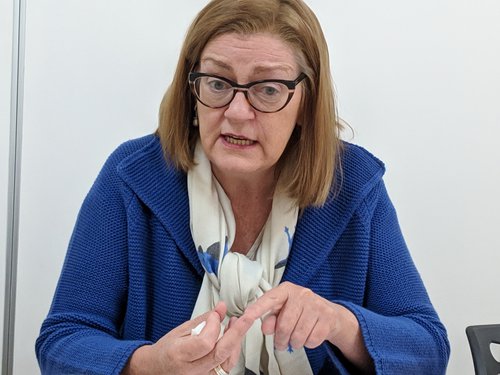
How do you see Nepal’s progress in the social sector, such as gender and education?
Well in education we’ve been working very closely with the government on the school sector development plan, it’s gone beyond its first phase now, it’s on its second phase. I think it’s a very good programme because it’s cross-sectoral with many, many ministries involved and I think this contributes very much to its success. We, of course, are very keen, at the very most elementary level that education is available equally for boys and girls and that they have equal access. I’m very heartened by the statistics that I see, that the ratio of boys to girls has increased over the years, many more girls are going to school now and this is good. The challenge of course is keeping these girls in school, once the first cycle is over, there’s a tendency for the children to drop out, we need to keep them to get them to the highest level of education possible which we’re trying to do. I would say another programme that we have that is very much linked to education is the nutrition programme that we organise with UNICEF which is our partner here. As you know I’m sure, throughout the country, in some areas more than others, there are very high rates of stumping, this is when children have not reached their proper height for their age and also weight. Both of these need to be addressed for children to be in the best place to receive education because while they’re hungry, while they’re malnourished, they’re not in the best position to benefit from education. So, we’re working very closely with UNICEF, I’ve just come back from Karnali, Province 5, where I have visited schools up there.
How do you approach this?
We have a number of different ways of approaching this, we have offices in the hospitals where the children are weighed at birth and then mothers are encouraged to come back with their babies to weigh them every month to see if they’re meeting the targets, that’s the first thing. Then there’s the ‘1000 Golden Days’, where the mothers are fed from the moment of gestation of the baby so the pregnant mothers are getting good nutrition throughout the 9 months, then when the baby is born, for the first year, the baby and the mother receive nutritional supplements; this is to give babies a good start in the world. You have seen this over time, it has been working, in fact the SOL Award was won by Professor Joshi of the Nepalese government for his efforts in this nutrition program. It is something we will be continuing again, we’ve done that first phase, we’re already into the second phase with UNICEF. We also have, as well as the school sector development plan, we have the vocational education training, CTVT, which is the Centre for Technical and Vocational Training. We’re getting into this because we really feel that we need to develop education in line with the skills needed by the work force here in Nepal, hopefully to bring down the level of migration so that young women and men can stay in Nepal and they have the skills to work in the market. So, this is an area we are working in very closely, we work with the British Council with about 14 million and another 5 million with the CTVT. Through the multi-sectoral nutrition plan we’ve spent about €22.5 million since it began and this is for the healthy growth of babies, this is the future as we see it, so we think that this is very important.
Regarding Nepal’s current restructuring of its state from a unitary to federal one with three tiers of elected government in center, province and local level, what has been your experience working in this environment in Nepal?
I think it is a huge challenge, I think it would be a huge challenge for any country, even the most developed countries and it’s particularly challenging for a country like Nepal that is still in a phase of development. You have a very big country, I know everybody in Nepal is always talking about little Nepal is, 28 million people is not little; it’s a big country and very spread out over a very difficult terrain, and sometimes in very inaccessible places, so it’s very difficult to easily decentralise in that kind of situation. For example, the constitution stipulates that a number of civil servants have to be deployed in the provinces and in the local authorities, but sometimes people don’t want to go to inaccessible areas, they worry will there be upright housing, will their children have good schools or will there be good medical facilities nearby, will they be able to see their parents who live elsewhere, or in Kathmandu, how often will they be able to maintain contact with friends and family. These are all very legitimate questions. And I think the government is doing very much its best to try to address these questions, it’s trying to encourage people to go also by offering promotion and helping them to understand and see that the facilities will grow around the new populations of these places. But it is a big challenge and it will take time, we must also bear in mind that you’ve had many, many centuries of central power here in Kathmandu. Also, it’s not just about changing the law, it’s about changing mindsets and it’s about decentralising power and devolution of power. I think it will come but it will take time, it will also take negotiations and consultations with the different levels with the provincial level and with the local authorities as the different responsibilities are allocated and different funds. Not just resources in terms of money but in terms of people and trained people.
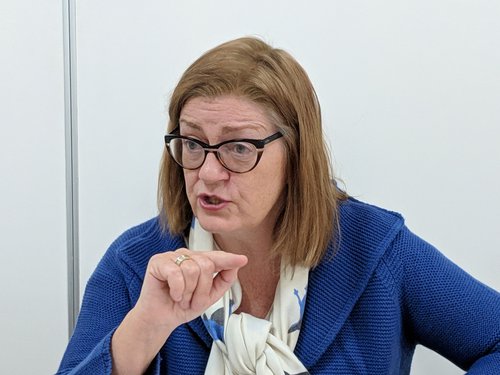
Nepal is drafting a new foreign aid policy, what would an organisation like the EU want to suggest on drafting such policy?
I think for Nepal the most important thing is that it follows Nepal’s best interests and that it takes account of its geo-political position in the world. What kind of country it wants to be and how it wants to operate with its neighbours, its near neighbours and also in the wider region and the world? These are the concerns that must be on the table for it to develop a policy that genuinely follows and reflects its interest. Nepal has two very big neighbours, India and China, it has historic ties with both countries, it has trade ties, it has language ties, it has cultural ties, these things are also very important to the Nepali people. The government’s electoral promise was: “Prosperous Nepal, Happy Nepali” and to have both of those it needs to have very good relations with its neighbours and the wider region. I’m also very happy to see Nepal engaging more broadly in multi-lateral forums such as the Human Rights Council, where it has a seat now. I think this is a very positive thing for Nepal to look outward and make friends and partners around the world. We hope that we, the European Union, are a strong friend and partner to Nepal and continue to be, that’s our ambition to have Nepal as our close friend and partner in our foreign policy.
After the completion of the elections of three levels, Nepal has a stable government and now two thirds of the majority are seeking support in infrastructure development. How does the EU views this?
This is what one hopes from a new government, that they will engage and that they will become involved in the federal structures and devolve power and make provincial government operational and also give local government its responsibilities. Ideally, this should bring governments more closer to the people, because you have far more people engaged and it should deliver on the kind of inclusiveness that the constitution promised. Ideally, also, it should allow the people to hold their locally elected representatives more accountable at each level. So, in principal I think this is a very good, I also think, as new governments grow at the local level and the provincial level, it could also be a very good trigger for economic growth because all of these new administrations will all need new schools, hospitals, more housing, more shops, more services, more transport, this should help spread the economy more throughout the country. Of course, this requires very transparent and accountable systems in government, unless you have that kind of accountability and transparency, you can create three levels of lack of transparency and three levels of corruption as well. The multiplier works both ways, it can be a multiplier for good, for transparency, for accountability, for inclusion and bring governments closer to the people but it can also be a multiplier for bad if it’s allowed to be, if there are no systems in place, it could be a multiplier for confusion, for corruption and lack of transparency so that not everybody benefits these new systems. It’s a cup half-full and a cup half-empty. Only as federalism develops shall we see where it’s going, hopefully in the right direction.
With the support of Nepal’s European Development partners including the European Union, Germany and the European Investment Bank, the construction of Chilime Trishuli Transmission Line has begun. How do you see this going?
I’m really very pleased about this project, I visited recently with the minister, with the vice-president of the European Investment Bank, with KFW the German bank and the German ambassador, we all went on a road trip to Chilime Trishuli to open the line. Actually, we were driving for about 5/6 hours in jeeps in really difficult terrain so we were able to see the inaccessibility and some the villages we passed we could see were off-grid, they were lit up by candles. So, we finally got to Trishuli and there we opened the ground-breaking ceremony, the minister came in his helicopter, he didn’t come by road like us, but we had a very good ceremony. I think this is a very good example of blending of moneys from different sources, we at the delegation contributed money, the European Investment Bank contributed money, KFW contributed money and we were able, together, then to fund something that couldn’t have been alone. So, I think this was a great example and I hope to see much more if it. After the ground-breaking ceremony the minister very kindly offered to bring us back in his helicopter so we didn’t have to walk and we didn’t have to drive all the way back again. So we were able to get the views over the mountains, I don’t know if you’ve seen the project but it’s absolutely amazing, you’ve got all these towers planted on the side of the mountain – it’s an engineering feat, really amazing thing. The vice-president of the European Investment Bank was very, very heartened to see this project, while he was here, we visited the finance minister, the MoFAGA (Ministry of Federal Affairs and General Administration) Minister, the environment, forestry and energy minister and a number of others. We invited him to the Talanoa Dialogue so he was able to speak about climate change as well, he gave a lot of key messages when he was there. The European Investment Bank wants to work more with Nepal, we want to invest more, particularly focusing on climate change so solar power, hydropower, wind power, green economy, also maybe the transport systems. For example, in India the EIB has been investing on metros so it’s invested big time in the metro in Bangalore, in the metro in Lucknow and they have a third one now that they’re starting in Pune. They also said they could be interested, I know the feasibility studies are only currently still underway, for a metro in Kathmandu but this could be an area. Another area that could of be interest would be electric shuttles to and from the airport for tourism. These are areas that they are considering and of course the digital economy is also very interesting. They want to work with partners, the EIB is the biggest non-profit bank in the world, people don’t always know that, they think it’s the World Bank of the Asian Development Bank but it’s not, it’s EIB. 90% of loans or grants go to Europe because it’s a European Investment bank but they have a 10% external lending mandate.
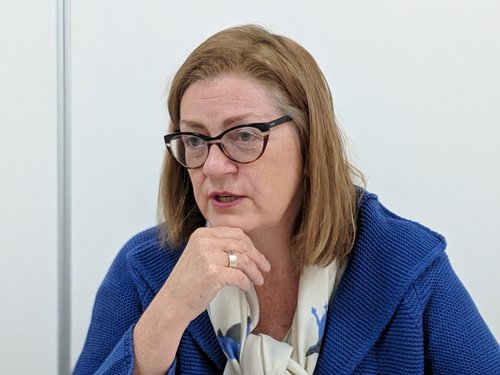
Nepal is one of the more weaker countries in terms of implementing climate change adaptation and mitigation projects promoting renewable energy and livelihood projects. How will the European Union support Nepal’s future direction in this endeavour?
First of all, we are one of the supporters of climate change, globally, we believe very much in acting and acting now. We were very vocal in the COP 24 in Katowice and will continue to be. Here we supported the government in having the Talanoa Dialogue and to try and join and mend the gaps that still need to be filled in climate change. For us, we’re very much in agreement with the government here, that the key areas are for vulnerable countries like Nepal and LDCs is capacity building, training, also the financing and we want to look at different modes of transport that were already discussed in the previous call and need now be developed. We also have number of projects in SWITCH Asia, where we have climate change projects ongoing here in Nepal. All of our development projects like, for example, we promote organic produce, organic fertilisers, do no harm principles in growth and education, very much more a green economy that is sustainable. Although our actions might not be labelled as climate change actions, they’re development usually, but they should be green, they should be sustainable. It’s the same what we’re doing under nutrition, we give local people crops, plants and seeds, we show them how to grow organic, we give them poultry, we show them how to feed them organically so that they’re self-sustainable, they have their kitchen-garden and they can grow food themselves without having to resort to artificial foods and supplements.
Finally, what are your thoughts on Brexit?
Ah Brexit. Well, we’re in a tricky moment, aren’t we? If an agreement is not reached, we will have a no deal or an exit without a deal and this will also be difficult to negotiate. In my view, we’re still at the beginning of a process not the end of a process, all of this has yet to be unfolded and to be discovered what will come afterwards. Of course, as a staunch European, I’ve been working with the European Union for 25 years and I regret very much the decision of the UK to withdraw from the European Union. It’s a decision I’m not sure will benefit the UK and I think we would certainly, at the European Union, be happier if the UK were still with us. However, looking forward, I think that whatever arrangements come out of Brexit, in the end, we will always continue to work with the United Kingdom. The United Kingdom is a very like-minded country, it upholds the basic principles and values of the European Union, it can still do that outside the EU. But we need to bear in mind that we’re all working for a better world and we’re going to have to work together. Whatever the modalities of that is another matter, but I’m sure we will work together.

Saima Pun
Pun is an intern from the UK
- NEPAL TOURISM CAMPAIGN #VisitNepal2020
- Mar 05, 2019
- Kathmandu’s Silent Killer
- Feb 10, 2019
- “The British Council Vave Got A Lot To Offer"
- Jan 26, 2019
- “You Get Violence Everywhere…The Problem Here, I Think, Is That There’s No Safety Net”
- Jan 26, 2019
- “What The UN Sees As A Challenge For Nepal … Is Inclusion”
- Jan 14, 2019

